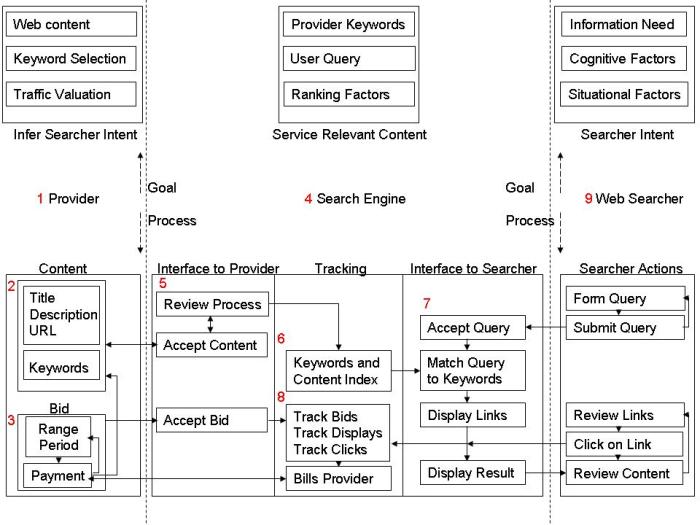Search Engine Trust and Search Engine Bias
I keep running into an interesting paradox in Web searching, including sponsored search, which is this simultaneous ‘trust in the search engines’ to provide relevant and useful information while there is an acknowledgement that search engines, like all technology or processes, have ‘inherent biases or unintended consequences’.
This trust in the face of inherent biases have implications at the cultural, societal, and business levels of analysis.
Been looking for some underlying theory to explain it. So far, nothing.
The Participants, Goals, and Process of Sponsored Search Process
I am working on the defining the participants and their goals in the process of sponsored search.
The process of sponsored search is continually evolving and gaining complexity as a means of satisfying both Web searchers’ desire for relevant information and content providers’ desire for targeted traffic to their Web sites.
However, although the payment process has undergone several incarnations, the conceptual elements of sponsored search have remained essentially the same.
The major participants and elements that I have identified are:
- Provider: a person or organization interested in generating user traffic to a particular Web site for some specific purpose. We use the term ‘provider’ rather than advertiser to highlight that one can view sponsored search as a version of providing relevant content to a searcher, and not solely an advertising medium.
- Provider Content: a set of keywords (representing concepts) along with the associated uniform resource locators (URLs), titles, and descriptions. Typically, referred to as an advertisement or a sponsored link. Although, these terms have a heavy commercial interpretation, their use has become commonplace within the sponsored search domain. Therefore, we use them in this paper when referring to the provider content displayed on the SERP.
- Provider Bids: bids for specified keywords that are a monetary valuation of traffic to a particular Web site by a provider.
- Search Engine: a search engine that serves the advertisement in response to user queries on SERP, relevant Web sites, or email.
- Search Engine Review Process: a method utilized by a search engine to ensure that provider’s content is relevant to the targeted keyword on contextual material.
- Search Engine Keyword and Content Index: a mechanism that matches provider’s keywords to user queries or to contextual material.
- Search Engine User Interface: an application for displaying provider content as links in rank order to a searcher. Typically, the interface displays the sponsored links with non-sponsored links on a SERP, within email messages, or along side content on a Web page.
- Search Engine Tracking: a means of matching keywords to queries, gathering provider’s content, bids, metering clicks, and charging providers based on searcher clicks on their displayed links.
- Searcher: an agent (i.e., human or automated surrogate) that actually clicks on a sponsored link that is deemed relevant.
Understanding Sponsored Search
While conducting research in a range of Web searching, marketing, advertising, and branding issues, as well as commenting on topics of interest in these areas, it became apparent to me that there is a critical need for a comprehensive manuscript on sponsored search.
There are plenty of ‘how to’ books, and some very good ones on sponsored search. However, these ‘how to books’ typically have a short life span. The technology and empirical findings are changing so rapidly that books written at this level soon become out of date.
What is not on the market is a book that deals with sponsored search at the theoretical, foundational, and critical elements level. This is the book that I intend to write, modeled on the approach taken by C. J. (Keith) van Rijsbergen when he wrote Information Retrieval, which is a book more than 30 year old dealing with the highly technical field of information retrieval. Although starting to wear a little, it is still a classic in the field. van Rijsbergen intentionally focused on theories (what there are in information retrieval), approaches, models, and methods. This approach spared the book the ravages of time.
Understanding Sponsored Search views keyword advertising (a.k.a., sponsored search, pay-for-click) as a uniquely contextual form of information interaction on the Web. Sponsored search is a distinctive type of interaction that combines both information push – and – pull and is increasingly important in locating information on the Web. It is also amazingly complex with additional aspects of customer research, marketing, advertising, customer intent, and branding. There are a variety of key performance indicators and methods to analyze the sponsored search process. Understanding how all of these foundational elements integrate will be an interesting challenge.
I am really looking forward to this! And, look forward to comments, feedback, suggestions, and critiques along the way.
